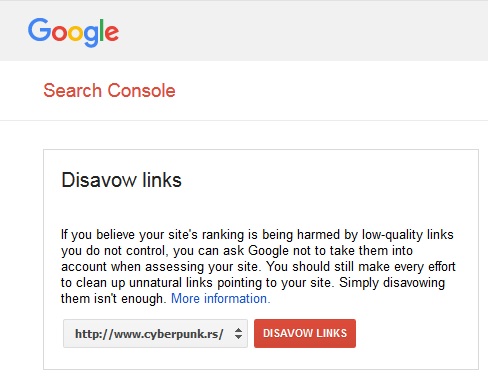Introduction
World of marketing.. The easies way to destroy your competitors is to crush their reputation, at least in the eyes of search engines (google, bing..). One way is Negative SEO. Main goal is to decrease opponent ranking, and maybe cause some penalty (de-ranking).

Negative SEO
Negative SEO effects are not always easily detectable. The effects are apparent once your website takes downward spiral in search ranking and incoming traffic. First, let’s check Negative SEO types. Similar to SEO, we have off-page and on-page segments:
Negative SEO (off-page)
Google bowling / Link farms / Low quality link flood: a series of web pages created for the sole purpose of linking to another page on the web. You can’t prevent this but you can spot it early enough to reverse the damage. You need to regularly monitor backlink link growth. Some of the tools mentioned below offers such services.Scraping: If you content gets copied across other sites, it can ruin your rankings. When google finds content that is duplicated, it will usually pick only one version to rank, and usually google knows which of the two is the original piece (the older one).. but in case google find the “stolen” version first, it may end badly for you. That’s why scrapers often automatically copy new content and repost it straight away. Copyscape, a tool you can use to find instances of content duplication. Try reaching out, contact website/domain owner and ask them to remove the copy. In case that doesn’t work out, report them using Google’s copyright infringement report.Have no mercy: Crashing a competitor’s website, intensive crawling and causing a heavy server load (DoS). If googlebot can’t access your site for a few times in a row, it might be a good reason for you to be penalized.
Negative On-page SEO
Changing your content: adding spammy content or links to a site(s). Usugally hidden with CSS(display:none)Redirectingyour users to some site: If you have poular, high authority website, someone might use that to increase their own site’s PageRank. If that domain/website is a malicious one, google could penalize you.Messing with your setup(access to your domain account, ex employee or being hacked):- Getting you site
de-indexed: One small change in robots.txt could destroy your entire SEO strategy. A disallow rule (“Disallow: /”) that would tell google to completely ignore your website. - Changing your location (taget country)
- Incorrect URL parameters in google search console:
- Removing a Disavow file
- Bad Domain Redirection: From penalized site to your own
- Rel Canonical: Tag is used to reduce duplicated content in google search. That tag is pointing to another page “as the original source”.
- Meta Noindex tag: That tag is saying Saying not to index your page(s).
- Autocomplete:
- Fake traffic: generating fake search traffic that includes something negative. AutoComplete: <Company> stock crash
- Scam Trick: creating fake page witch a company name, including something bad, AutoComplete:<company> scam
- Spammy pages: Filling your site with duplicated content pages.
- Getting you site
Getting hacked: In case you get “This site may be hacked” message near your domain in search results, it will definitely deter some users from clickin on it => lower traffic.

Mayhem: Crashing your competitor’s site, intensive crawling or some other action with the goal of causing heavy server load (DoS – hundreds of ways). If googlebot can’t access your site for a few times in row, you might be penalized.
Neagtive SEO Signs
Some signs that might indicate negative SEO actions:
- a sudden drop in organic traffic
- huge influx of backlink
- drop in ranking
- website “slowness” (might be a hosting problem)
- …
Disavow
In case you don’t know what’s disavowing a domain/link is, it’s basically telling your search engines to ignore certain back-links. The more links pointing towards your site the better, right? Not always.. Certain links will hurt your site’s SEO if you don’t remove them. For instance if you have a lot of links coming in from unrelated/spammy websites, such things tells google that you’re trying to artificially increase the number of links pointing to your domain, and you will probably be penalized (Penguin). There is a talk on how Penguin automatically readjusts the ranking with spammy links, but are still some implicit algorithmic penalties. Bad (back)links still slip through the cracks.


How to know which links to Disavow. Good links usually will most probably have related content. Anyway, gather links and find number of domains/links (uniq ones), look for the signs:
- Content: If domains in question publish illegal (explicit) content, have some sign of malicious behaviour or is a part of link farm / PBN (Private Blog Networks) you probably have a problem in your hands
- A large number of links that come from unrelated domains (content wise)
- Increasing number of links from low-quality pages
- Links from sites with penalty
- Overly optimized Keyword(s) in the anchor text: everyback link points to your website with an anchor text of the exact same keyword you’re traying to rank for
- Backlinks from profiles and forums
- Links from comments
- Backlinks from non-targeted foreign country
- Widgets with keywords links towards your site
- Links coming from a Hacked Website
- Links with flagged keywords (viagra, cialis ..)
Some free backlink checking tools:
- Cognitive SEO
- Quick Backlinks
- SEO Spyglass
- Monitor Backlinks Tool
- Exalead
- Blekko
- SEO Attack
- Link Diagnosis
- Open Site Explorer
- MajesticSEO
- BacklinkWatch
- Ahrefs
Conclusion
Negative SEO is not a frequent occurrence/threat, but it happens. Pay attention to details. Keep your security tight and backup schedule in order. Regularly take random inspection of your website (system and logs), check referal links, outgoing links, conduct SEO analysis (at least some of it).




![Buffer Overflow [Linux, GDB] Buffer Overflow [Linux, GDB]](https://cdn.cyberpunk.rs/wp-content/uploads/2020/08/buffer-overflow-bg-500x275.jpg)